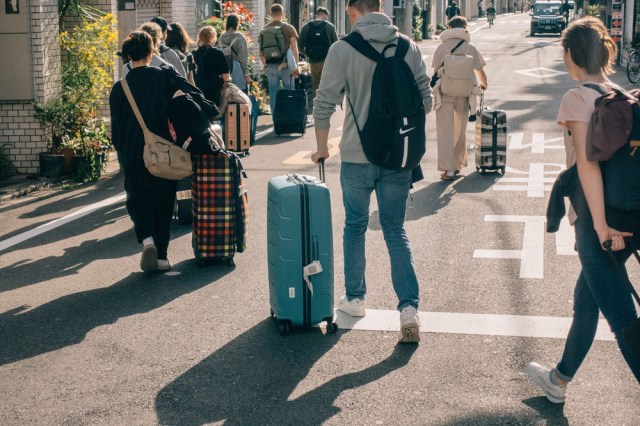
10 things to think about before taking your trip to Japan.
Japan is an amazing place to visit. Whether you want to see historical architecture, modern pop culture, breathtaking natural scenery, or just eat some really, really good food, Japan’s myriad wonders have turned it into a top destination for international travelers.
Of course, Japan isn’t perfect, and so not every trip to the country is nonstop enjoyment. Japanese inbound tourist-focused travel website Good Luck Trip recently conducted an online survey asking people who’ve visited Japan what sort of inconveniences or problems they encountered. Responses were collected from 891 participants (106 using English, 102 Korean, 103 simplified Chinese, and 580 traditional Chinese), and the organizers have released the top 10 results.
Let’s take a look at the top 10.
1. Wi-Fi environment (31.5 percent of respondents)
2. Not being able to communicate with facility staff (20.2 percent)
3. Lack of non-Japanese signage and difficulty understanding it (17.5 percent)
At the top of the list, chosen by 31.5 percent of respondents, is “the Wi-Fi environment.” Free Wi-Fi in public spaces isn’t as easy to find in Japan as it is in some other countries, and when entertainment facilities or restaurants do offer it, signage for it usually isn’t very prominent, and the explanations are often only in Japanese.
Speaking of language barriers, the number-two problem foreign travelers ran into was “not being able to communicate with facility [restaurants, shops, etc.] staff,” followed by “lack of non-Japanese signage and difficulty understanding it.” While major shopping centers and chain restaurants often have information desk receptionists and menus that can provide guidance in English, Chinese, or Korean, smaller independent businesses often only have Japanese-speaking staff.
▼ And, as anyone who’s traveled much in Japan can tell you, even when translations are provided they’re not always the most easily intelligible.
4. Difficulties using public transportation (approximately 16 percent)
5. Lack of trash cans (approximately 16 percent)
Number 4 is a bit of a headscratcher, as Japan’s public transportation system is regularly praised by overseas visitors for its punctuality, convenience, and cleanliness. The vagueness of the category doesn’t offer much of a hint as to what the specific complaints were. Maybe it’s an extension of the language barrier-related problems mentioned at numbers 2 and 3 on the list, or maybe it’s just a matter of how navigating a dense train and subway network in a town you’ve just arrived in as a tourist is always a little tricky, regardless of the country you’re in.
Japan’s lack of public trash cans is something visitors have been grumbling about for decades. Oddly enough, it’s more or less a non-issue for locals. Japan generally finds it unmannerly to eat while walking, so most snacks are consumed either at the store where they were purchased (and where trash can usually be thrown away) or at home, and on those occasions that Japanese people are going to be eating in a park or something, it’s a decision they usually make with the understanding that they’re going to need to carry their trash home with them.
6. Difficulty using mobile payment apps (approximately 15 percent)
7. Difficulty using credit/debit cards (approximately 15 percent)
8. Lack of places to smoke/understanding where to smoke (approximately 14 percent)
9. Exchanging currency (approximately 14 percent)
10. Discount train/subway tickets (approximately 9 percent)
Next we have a pair of complaints connected to Japan’s continuing love of cash, or really three if we count difficulties in finding a place to exchange foreign currency. It’s worth noting that cashless payment apps are becoming more common in Japan, but that doesn’t necessarily meant that whatever platform you normally use in your home country will work in Japan.
Lack of places to smoke is a confusing entry, as even though Japan has been expanding restrictions on where smoking is allowed, many buildings have dedicated smoking rooms, and there are also smoking spaces set up near many train stations. Similarly, the nature of the abstract “discount train/subway tickets” problems is a little hard to suss out, seeing as how Japan has a huge assortment of discounted and unlimited-ride tickets offered at the city, regional, and national levels, but maybe the complaint is about the difficulties travelers had in figuring out which was best for them.
Luckily, there are ways to avoid or alleviate most of these issues. Most major sightseeing areas have tourist assistance desks that can provide guidance in English or other non-Japanese languages, including helping you understand how to get where you need to go on the train. Japan’s low crime rate means there’s relatively little risk to exchanging a large sum of cash at the airport and carrying a lot of it on yourself so you don’t have to worry about whether or not a roadside taiyaki stall is equipped to accept your credit card or payment app. And as for the lack of trash cans? Stop in any Daiso or other 100 yen shop, get yourself a pack of plastic bags, and put a few in your bag every day before you go out sightseeing in case you don’t find a trash can until you’re back at your hotel.
Because even if Japan isn’t a convenient place to travel 100 percent of the time, it is 100-percent worth traveling to.
Source: PR Times
Top image: Pakutaso
Insert images: Pakutaso, SoraNews24, Pakutaso (2, 3)
● Want to hear about SoraNews24’s latest articles as soon as they’re published? Follow us on Facebook and Twitter!

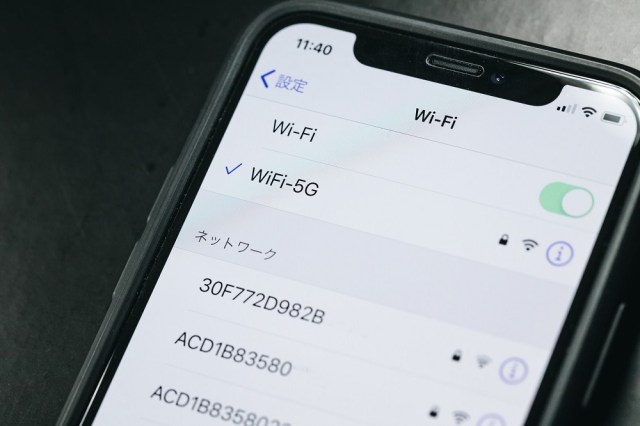
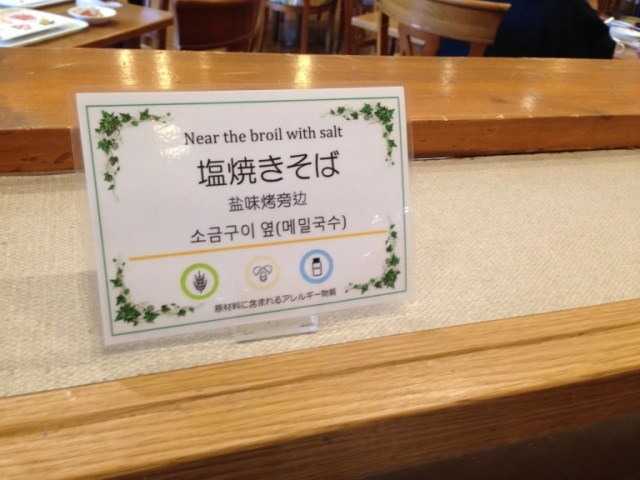
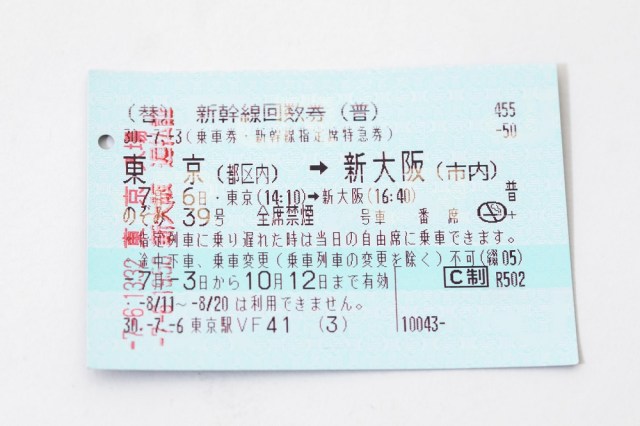
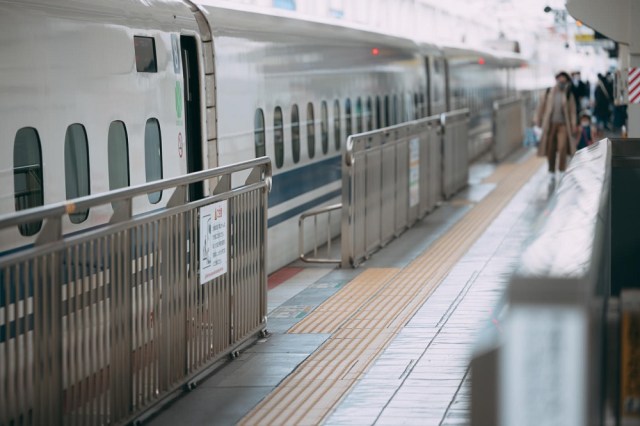
 10 best Studio Ghibli anime, as picked by Japanese fans– Different ages have different answers
10 best Studio Ghibli anime, as picked by Japanese fans– Different ages have different answers What do Japanese kids want to be when they grow up? For 30 percent of boys, YouTubers, survey says
What do Japanese kids want to be when they grow up? For 30 percent of boys, YouTubers, survey says Over 30 percent of surveyed Japanese managers feel intense stress from working with foreigners
Over 30 percent of surveyed Japanese managers feel intense stress from working with foreigners How often do Japanese high school kids watch anime, and do boys and girls watch the same series?
How often do Japanese high school kids watch anime, and do boys and girls watch the same series? Why is Japan such an unpopular tourist destination?
Why is Japan such an unpopular tourist destination? Foreigner’s request for help in Tokyo makes us sad for the state of society
Foreigner’s request for help in Tokyo makes us sad for the state of society Seaside scenery, history, and so many desserts on Yokohama’s Akai Kutsu【Japan Loop Buses】
Seaside scenery, history, and so many desserts on Yokohama’s Akai Kutsu【Japan Loop Buses】 Mikado Coffee is a 76-year-old coffee chain with a major celebrity connection
Mikado Coffee is a 76-year-old coffee chain with a major celebrity connection Japan’s massive matcha parfait weighs 6 kilos, contains hidden surprises for anyone who eats it
Japan’s massive matcha parfait weighs 6 kilos, contains hidden surprises for anyone who eats it Japanese city loses residents’ personal data, which was on paper being transported on a windy day
Japanese city loses residents’ personal data, which was on paper being transported on a windy day Suntory x Super Mario collaboration creates a clever way to transform into Mario【Videos】
Suntory x Super Mario collaboration creates a clever way to transform into Mario【Videos】 Hey, Japanese taxi driver! Take us to your favorite restaurant in Tsuruga City!
Hey, Japanese taxi driver! Take us to your favorite restaurant in Tsuruga City! We eat at three Japanese family restaurants to find the one with the best-value breakfast
We eat at three Japanese family restaurants to find the one with the best-value breakfast This is the first cafe in Japan to serve Mont Blanc, and it’s closing down after 90 years【Taste test】
This is the first cafe in Japan to serve Mont Blanc, and it’s closing down after 90 years【Taste test】 There’s a new world’s largest anime robot statue, and it’s not in Japan【Photos】
There’s a new world’s largest anime robot statue, and it’s not in Japan【Photos】 McDonald’s new Happy Meals offer up cute and practical Sanrio lifestyle goods
McDonald’s new Happy Meals offer up cute and practical Sanrio lifestyle goods Japanese ramen restaurants under pressure from new yen banknotes
Japanese ramen restaurants under pressure from new yen banknotes French Fries Bread in Tokyo’s Shibuya becomes a hit on social media
French Fries Bread in Tokyo’s Shibuya becomes a hit on social media Red light district sushi restaurant in Tokyo shows us just how wrong we were about it
Red light district sushi restaurant in Tokyo shows us just how wrong we were about it New private rooms on Tokaido Shinkansen change the way we travel from Tokyo to Kyoto
New private rooms on Tokaido Shinkansen change the way we travel from Tokyo to Kyoto Tokyo Tsukiji fish market site to be redeveloped with 50,000-seat stadium, hotel, shopping center
Tokyo Tsukiji fish market site to be redeveloped with 50,000-seat stadium, hotel, shopping center Beautiful Ghibli sealing wax kits let you create accessories and elegant letter decorations【Pics】
Beautiful Ghibli sealing wax kits let you create accessories and elegant letter decorations【Pics】 Secret Kitchen bento serves Japanese flowers, birds, wind and moon in a box, but is it worth it?
Secret Kitchen bento serves Japanese flowers, birds, wind and moon in a box, but is it worth it? New definition of “Japanese whiskey” goes into effect to prevent fakes from fooling overseas buyers
New definition of “Japanese whiskey” goes into effect to prevent fakes from fooling overseas buyers Our Japanese reporter visits Costco in the U.S., finds super American and very Japanese things
Our Japanese reporter visits Costco in the U.S., finds super American and very Japanese things Studio Ghibli releases Kiki’s Delivery Service chocolate cake pouches in Japan
Studio Ghibli releases Kiki’s Delivery Service chocolate cake pouches in Japan All-you-can-drink Starbucks and amazing views part of Tokyo’s new 170 meter-high sky lounge
All-you-can-drink Starbucks and amazing views part of Tokyo’s new 170 meter-high sky lounge More foreign tourists than ever before in history visited Japan last month
More foreign tourists than ever before in history visited Japan last month New Pokémon cakes let you eat your way through Pikachu and all the Eevee evolutions
New Pokémon cakes let you eat your way through Pikachu and all the Eevee evolutions Disney princesses get official manga makeovers for Manga Princess Cafe opening in Tokyo
Disney princesses get official manga makeovers for Manga Princess Cafe opening in Tokyo Sales of Japan’s most convenient train ticket/shopping payment cards suspended indefinitely
Sales of Japan’s most convenient train ticket/shopping payment cards suspended indefinitely Sold-out Studio Ghibli desktop humidifiers are back so Totoro can help you through the dry season
Sold-out Studio Ghibli desktop humidifiers are back so Totoro can help you through the dry season Japanese government to make first change to romanization spelling rules since the 1950s
Japanese government to make first change to romanization spelling rules since the 1950s Ghibli founders Toshio Suzuki and Hayao Miyazaki contribute to Japanese whisky Totoro label design
Ghibli founders Toshio Suzuki and Hayao Miyazaki contribute to Japanese whisky Totoro label design Doraemon found buried at sea as scene from 1993 anime becomes real life【Photos】
Doraemon found buried at sea as scene from 1993 anime becomes real life【Photos】 Tokyo’s most famous Starbucks is closed
Tokyo’s most famous Starbucks is closed One Piece characters’ nationalities revealed, but fans have mixed opinions
One Piece characters’ nationalities revealed, but fans have mixed opinions We asked a Uniqlo employee what four things we should buy and their suggestions didn’t disappoint
We asked a Uniqlo employee what four things we should buy and their suggestions didn’t disappoint Free Wi-Fi is coming to Mt. Fuji this summer
Free Wi-Fi is coming to Mt. Fuji this summer What are the most and least attractive hobbies for Japanese men and women? Survey investigates
What are the most and least attractive hobbies for Japanese men and women? Survey investigates Survey reveals that Japanese women’s ideal husband is surprisingly ordinary
Survey reveals that Japanese women’s ideal husband is surprisingly ordinary Survey says more sixth graders in Japan aspire to work in medicine this year than last year
Survey says more sixth graders in Japan aspire to work in medicine this year than last year What do Japanese kids want to be when they grow up? Businesspeople
What do Japanese kids want to be when they grow up? Businesspeople What’s the top country people want to visit after the pandemic? Japan, survey says
What’s the top country people want to visit after the pandemic? Japan, survey says Japan’s favorite Pokémon types by prefecture–which types are the most popular?
Japan’s favorite Pokémon types by prefecture–which types are the most popular? “Scholar” tops list of what Japanese boys want to be when they grow up, “restauranteur” for girls
“Scholar” tops list of what Japanese boys want to be when they grow up, “restauranteur” for girls What should Tokyo’s newest rail station be called? Poll asks high school girls for their opinion
What should Tokyo’s newest rail station be called? Poll asks high school girls for their opinion Japanese fans make landslide pick for next anime they want a Hollywood live-action adaptation of
Japanese fans make landslide pick for next anime they want a Hollywood live-action adaptation of “Recycling in Japan” or “Reasons to get it right and avoid eternal shame”
“Recycling in Japan” or “Reasons to get it right and avoid eternal shame” Free Wi-Fi announced for Tokyo Monorail
Free Wi-Fi announced for Tokyo Monorail Could you marry an otaku? Japanese people rank the geek hobbies they’d let slide for love
Could you marry an otaku? Japanese people rank the geek hobbies they’d let slide for love How many times a day do Japanese men adjust their junk? New survey investigates
How many times a day do Japanese men adjust their junk? New survey investigates Japanese women asked what best job for a husband is, may be looking for romantic-comedy lead
Japanese women asked what best job for a husband is, may be looking for romantic-comedy lead
Leave a Reply